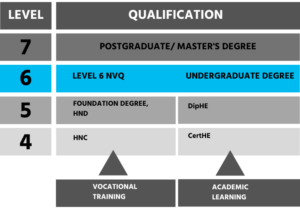What Is a Level 6 Qualification?
Level 6 qualifications represent advanced learning, typically provided by universities and higher education institutions. These courses are designed to deepen knowledge and expertise in a specific field, preparing students for professional careers or further academic study.
Understanding which Level 6 qualifications are available is important for anyone considering university or aiming looking for a course to help their career development. This quick guide covers the main course types available from UK HE providers.
National Qualifications Framework
In the UK, there are nine levels of qualification, starting at zero and going up to eight as the highest level of learning. Level 6 is classed as higher education and advanced knowledge.
Regulated Qualifications Framework (RQF)- Level 6

What Can You Do With a Level 6 Qualification?
Level 6 qualifications demonstrate an advanced level of learning and knowledge in a subject area. They open the doorway to graduate roles, the professions, and further study at postgraduate level.
Level 6 qualifications can help with the following:
- Admission to postgraduate courses
- Licence to practice in certain professions
- International work visa requirements
- Professional body memberships
Undergraduate Bachelor’s Degrees
Undergraduate degrees comprise of 3 year’s worth of study made up of a total of 360 CATS points. While a degree certificate is a level 6 qualifications, it is only the final year that is considered level 6 learning.
| Undergraduate Bachelor’s degree | ||
|---|---|---|
| Year | RQF Level | Credits |
| 1 | 4 | 120 |
| 2 | 5 | 120 |
| 3 | 6 | 120 |
Bachelor’s degrees have a number of award designations based on the subject area of study.
- Bachelor of Science (BSc)
- Bachelor of Arts (BA)
- Bachelor of Education (BEd)
- Bachelor of Engineering (BEng)
- Bachelor of Laws (LLB)
- Bachelor of Medicine, Bachelor of Surgery (MBChB)
In the UK, only institutions with degree-awarding power can issue degree certificates. Some education providers teach degree programmes graded and awarded by a university with degree-awarding powers (NCC Education is an example). For reference, we have a complete list of UK universities and higher education providers with degree-awarding power.
A levels are the standard entry route for bachelor’s degrees that start at level 4 and work up to level 6 in their final year. However, mature students, anyone over the age of 21, can take an access course offered by most further education colleges in place of A levels.
Graduate Certificate- GradCert
A graduate certificate is a higher education certificate at level 6. It is a highly focused, bite-sized course comprising 15 CAT points or credits and takes around 150 hours to complete.
Graduate Diploma- GradDip
Offered by universities, Graduate Diplomas are longer and cover more learning than Graduate certificates. They are 120 credits and equivalent to one year of full-time education.
Level 6 Vocational Qualifications
Vocational qualifications are designed to provide the practical skills and knowledge to help boost an individual’s career progression and prospects. The courses available match the skills businesses are looking for, from managing people to computer coding.
The number of credits these courses have can vary. The certificate titles below are listed in size order. Awards are generally short courses with NVQs and diplomas taking up to a year or more to complete.
- Level 6 Awards
- Level 6 Certificates
- Level 6 Diplomas
- Level 6 NVQs
Entry Level Qualifications
In general, you need to have completed a level 4 and 5 course to start a level 6 qualification.
For stand-alone Level 6 qualifications, such as Top-up degrees or Level 6 Certificates & Diplomas, you need to have completed enough credits at levels 4 and 5 to qualify for entry.
Qualifying level 5 certificates include
- HND
- Diploma of Higher Education
- Level 5 NVQ
- Foundation Degree
